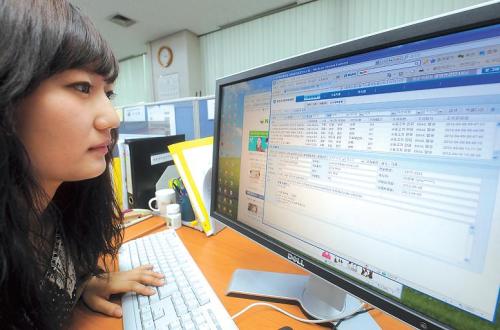The general elections may now be over for candidates and voters, but not for the nation’s election watchdog, especially its cyber observer team which is to operate 24 hours a day for another 10 days.
“People hardly notice our existence except the official election campaign period,” said Park Sung-min, officer at Cyber Investigation Division of the National Election Commission in Gwacheon, Gyeonggi Province.
“The team, however, is a permanent organization up and running throughout the year, keeping watch on preliminary candidates for all national elections.”
According to the local public office election law, the commission is required to operate a standing cyber watchdog and may increase its staff by as much as 10 members from 60 days before the election day and for 10 days after the voting ends.
The team receives reports from citizens and monitors major online portal sites for illegal online campaigns. This time it used an automatic search system which detected the names of all 920 candidates in the 246 constituencies nationwide and their related keywords.
“It is true that the range of online campaigning has been expanded, but not all controversial remarks in cyberspace comply with the election law. Some of them constitute violations of the law,” Park said.
The National Election Commission officially announced in January that it would fully permit online election campaigning following the Constitutional Court ruling late last year.

An official of the National Election Commission’s Cyber Investigation Division searches for breaches of the election law on the Internet. (Lee Sang-sub/The Korea Herald)
Candidates were therefore able to promote themselves and their policies at any time on the internet, unless it involved slander of or false information about a rival candidate.
“The key point is that a reported or detected remark has to be either slander or false information, not a verbal insult, to be recognized as a violation of election campaign law,” said the official.
For example, dissenters of a certain candidate would often use the words “commie” or “pro-Japanese” as descriptions of the candidate, depending on political tendency, he said.
“These words may sound insulting but in most cases do not constitute slander as defined in the election law,” he said.
Sex scandals, too, are used in negative campaigning.
“Male candidates are usually accused of taking sexual favors or having an affair with a married woman, whereas female members are subject to sexual insults,” he said.
The top priority for the team is to check whether the allegations are true and if not, to take appropriate measures to stop them from spreading online.
“Citizens, especially supporters of a victimized candidate, would not understand why the National Election Commission would not interfere in private matters and even accuse us of being politically biased,” Park said.
Upon detecting a violation, the watchdog asks the portal site or individual who posted the remark to remove it.
Complicated as the process may become when the illegal post is hosted overseas, the team’s official request for deletion is generally quite effective, especially if it is made at the right time, he said.
“Many worry about the fast and irrevocable spread of information, which is an important characteristic of social networking services in vogue,” Park said.
“However, the news circulation on SNS is largely based on the internet, so it may be toned down if the original source is regulated.”
A bigger dilemma facing the cyber campaign watchdog is that the intensity of mudslinging has grown over the years, though the number of cases has not changed much.
“Only 13 cases have so far been handed over to the prosecution for investigation. All of them have struck politically fatal blows against the target candidates,” Park said.
Novice members of the team had to overcome a kind of culture shock while filtering offensive slang, he added.
“Despite such difficulties, our role is vital for a fair and clean election, as the spread of false information would negatively influence not only the voting results but also damage the lives of the voters,” Park said.
By Bae Hyun-jung (
tellme@heraldcorp.com)

![[KH Explains] No more 'Michael' at Kakao Games](http://res.heraldm.com/phpwas/restmb_idxmake.php?idx=645&simg=/content/image/2024/04/28/20240428050183_0.jpg&u=20240428180321)



![[Grace Kao] Hybe vs. Ador: Inspiration, imitation and plagiarism](http://res.heraldm.com/phpwas/restmb_idxmake.php?idx=645&simg=/content/image/2024/04/28/20240428050220_0.jpg&u=)
